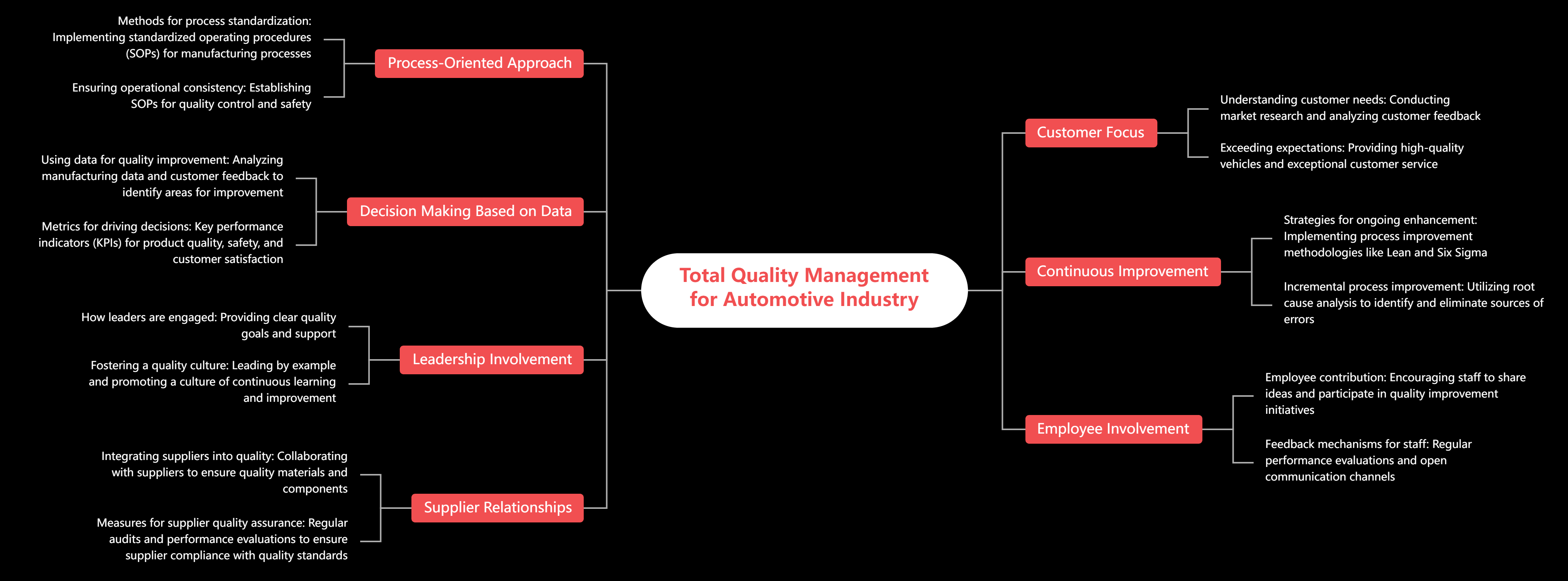
Description of the Mind Map Content
The mind map outlines various aspects of TQM in the automotive sector. It is structured around key principles and practices, including a process-oriented approach, customer focus, data-driven decision-making, continuous improvement, leadership involvement, employee engagement, and supplier relationships.
- Process-Oriented Approach: Describes the importance of standardized operating procedures (SOPs) for manufacturing processes, ensuring operational consistency, quality control, and safety.
- Customer Focus: Highlights the significance of understanding customer needs through market research and feedback. It stresses the importance of exceeding customer expectations by delivering high-quality vehicles and exceptional customer service.
- Decision Making Based on Data: Emphasizes the use of data analysis for quality improvement, including examining manufacturing data and customer feedback. Key performance indicators (KPIs) are recommended for driving decisions related to product quality, safety, and customer satisfaction.
- Continuous Improvement: Outlines strategies for ongoing enhancement, such as implementing methodologies like Lean and Six Sigma. The importance of incremental process improvement through root cause analysis is also highlighted.
- Leadership Involvement: Describes the role of leaders in setting clear quality goals, providing support, and fostering a culture of continuous learning and improvement.
- Employee Involvement: Discusses the significance of employee contribution to quality improvement initiatives, encouraging the sharing of ideas, and establishing feedback mechanisms through regular performance evaluations and open communication channels.
- Supplier Relationships: Addresses the integration of suppliers into the quality assurance process. This involves collaborating with suppliers to ensure the quality of materials and components, along with measures like regular audits and performance evaluations to maintain compliance with quality standards.
Insights from the Mind Map
From this mind map, it is evident that the successful implementation of Total Quality Management in the automotive industry requires a holistic approach. Insights include the importance of standardized processes, a customer-centric focus, data-driven decision-making, continuous improvement strategies, active leadership and employee involvement, and strong relationships with suppliers. The mind map provides a comprehensive overview of the interconnected elements crucial for achieving and maintaining high-quality standards in the automotive manufacturing process.
Creating Mind Maps with Visual Paradigm Smart Board
Visual Paradigm Smart Board emerges as a versatile online mind map software, seamlessly integrating the functionalities of a mind map maker and brainstorming tool. This innovative tool facilitates a process-oriented approach, enabling users to implement standardized operating procedures (SOPs) effortlessly. With its user-friendly interface, it empowers teams to collaboratively develop and refine ideas in real-time, fostering operational consistency and quality control. The platform supports a customer-focused strategy by providing tools for market research and feedback analysis, assisting in exceeding customer expectations. Decision-making based on data becomes intuitive, as the tool offers robust features for analyzing manufacturing data and customer feedback. Visual Paradigm Smart Board also excels in promoting continuous improvement, offering methodologies like Lean and Six Sigma for ongoing enhancement. With leadership and employee involvement at its core, this online mind map tool creates a conducive environment for a culture of continuous learning and improvement. Additionally, it facilitates seamless collaboration with suppliers, ensuring quality materials and components through regular audits and performance evaluations. In essence, Visual Paradigm Smart Board emerges as a valuable asset, seamlessly intertwining the elements essential for effective Total Quality Management in the automotive industry.